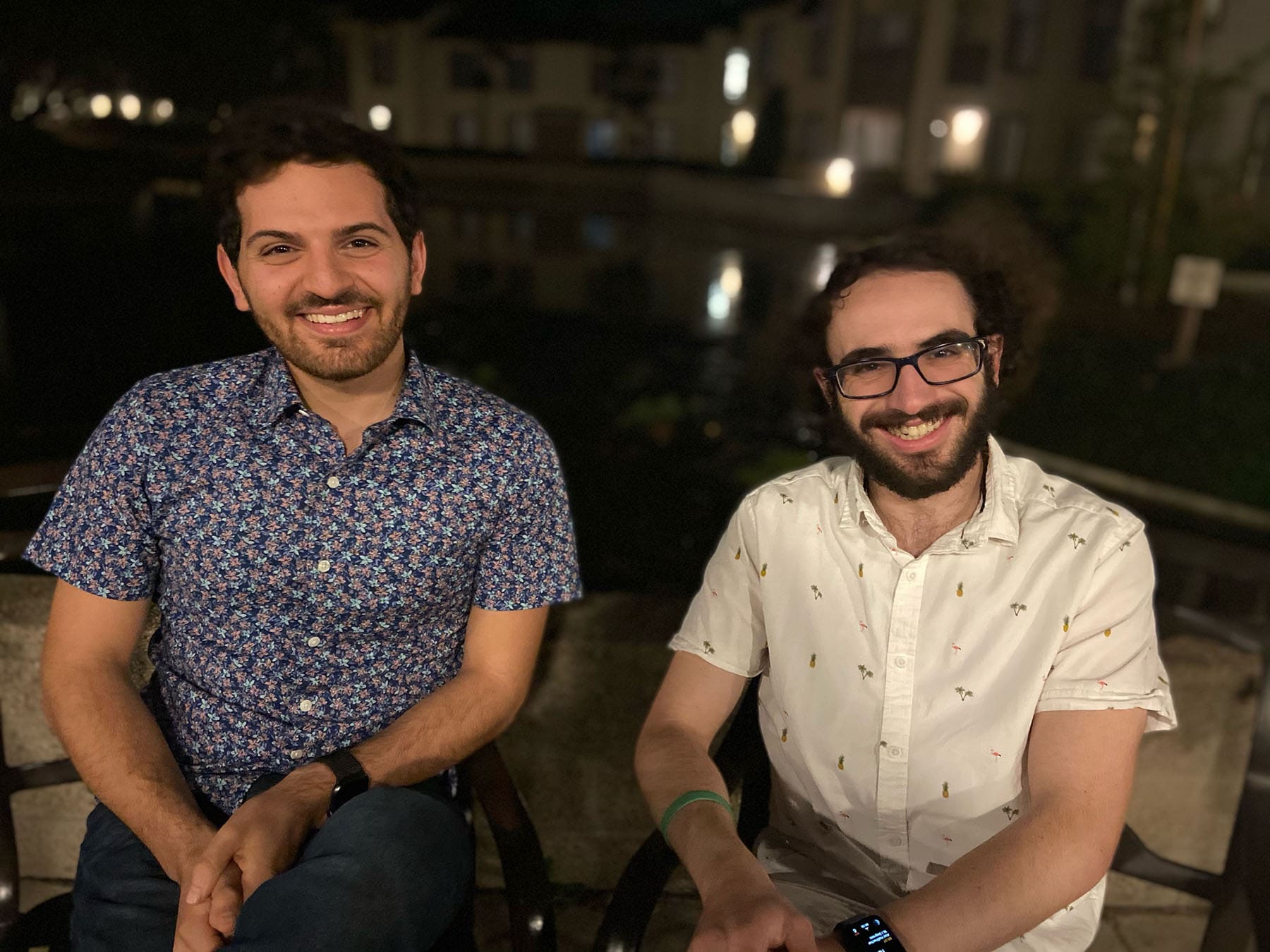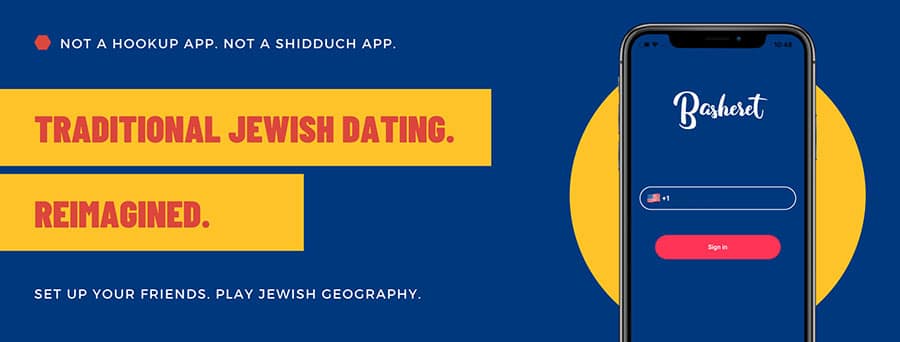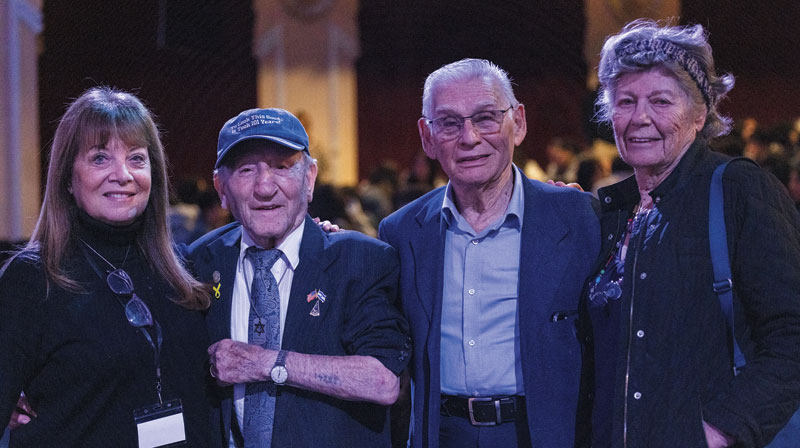
Los Angeles native Asher Naghi never really used dating apps. After witnessing his friends put themselves out there only to remain single, Naghi, 24, took it upon himself to create a Jewish dating app where matching with someone is likely.
“We wanted to make something that everyone would feel comfortable on, something that reflects organic experiences,” Naghi said. “My friends and I pitched this as a joke but got outstanding feedback. So, we started to work on the product.”
In early August, Naghi, along with his fellow UCLA alum Joey Levin and Maia Groman, launched Basheret (“meant to be” in Hebrew).
Basheret offers an array of profile questions that better represent a user’s Jewish personality mixed with Jewish geography. Questions vary from Jewish denomination, Shabbat observance and what summer camp they attended to questions about hobbies, profession, hopes and future aspirations.
While the name may be traditional, the app is anything but. Users will still find structural similarities to others—Tinder, Hinge, Bumble, JSwipe and JWed, respectively—a major difference is that you only get three suggestions a day to swipe left or right on.
Naghi specifically wanted users to slow down and look at the personality of users before only judging the photo. He said many aimlessly swipe when they have an endless amount of options.
“We’re not trying to make it about swiping,” Naghi admits. “Consider this person, talk to them, look through their entire profile and try to have an organic experience. We wanted to build it with non-addictive qualities. We think getting people on this app consistently is more important than having them on the app for long periods of time daily.”
Naghi noted that people can swipe through every user in their area and run out, then become tired and check back later. He and his team wanted to ensure that it isn’t about running through all your options at once. Instead it’s about taking the time to see what is out there and if you are both compatible.
The app started with more than 900 users and has since tripled user count around the country. To date, they have made more than 430 matches. To name a few, they have users in Los Angeles, New York, Detroit, Boston, Chicago and Toronto. Naghi added they hope to have a Hebrew version available in Israel soon.
To date, they have made more than 430 matches.
The creator also said one of the “quintessential things in the Jewish world” is matchmaking, either professionally or through friends and family. On Basheret, users have an option to enter Yenta mode so they can play matchmaker. The app syncs with your contact list so users can refer their friends to people they see on this site. He said the feature blends traditional shidduch profiles (Jewish arranged marriages) and online dating together in a modern way.
Mashable reported in November that between September and October of 2020, major dating apps including niche dating apps grew in popularity, despite the ongoing COVID-19 pandemic.
“Match grew 21 percent; OkCupid grew 21 percent; and Bumble grew 16 percent,” the report from Nov. 11 stated. “Other big hitters like Tinder and Hinge grew as well, but more modestly. Black singles app BLK grew the most out of Blacker’s sample with 23 percent month-over-month growth.”
The article also suggests that dating app users are spending more time on user profiles to see if they are emotionally compatible rather than just attraction.
Joey Levin, co-founder and chief technical officer of the app, was concerned at first about the app’s success since it launched during the pandemic. The 24-year-old was surprised and excited to see the session time on the app growing from users who simply wanted to find connection during quarantine even if dates were happening virtually. Levin, who doesn’t regularly use dating apps, joined Basheret during the pandemic so he could have a meaningful dating experience.
“Finding people who are interested in serious relationships are hard to find, it’s more of a hookup culture,” Levin said. “Most people on [the app] are here for [that]. The hope as time goes by is that we are able to maintain that identity.”
The Basheret team has heard from users that the app was a nice change of pace from the hookup culture and ghosting that occurs on dating platforms. “I think it opened up avenues for people, especially those who have never tried dating apps before,” Naghi said.
Michael Felsenthal from the Pico-Robertson area said that he had tried a variety of dating apps including traditional Orthodox formats, casual Jewish dating apps and Facebook groups. After giving the app a try, he liked how specific each profile was and the clarity that comes with it.
“It’s better to know going in where you stand with someone before it ends with someone getting hurt,” Felsenthal, 28, said. “Basheret makes Jewish dating clear.”
While he has matched with a few different people, his goal remains the same, to find someone he can have a meaningful relationship with that hopefully can lead to an engagement.
“Basheret stands out to me because not only does it have the better filters, but I feel like it is geared more to the Orthodox crowds. [Joey and Asher] get it and they understand where I’m coming from.”
Levin and Naghi said while they’re happy people are enjoying the app, their ultimate goal is for users to leave the app because it means they’ve found matches, maybe even their Basheret. While they are on the app, Naghi wants everyone to enjoy themselves in this virtual dating space.
“At least 60 percent of dating comes from apps. People are finding meaningful relationships through dating apps. The Jewish community I think has been moving towards it more across the denominational spectrum,” he said. “We built it so people could have fun, meet each other and have a positive Jewish dating experience.”
Learn more about Basheret, and download the app on iOS and Android here.






















 More news and opinions than at a Shabbat dinner, right in your inbox.
More news and opinions than at a Shabbat dinner, right in your inbox.